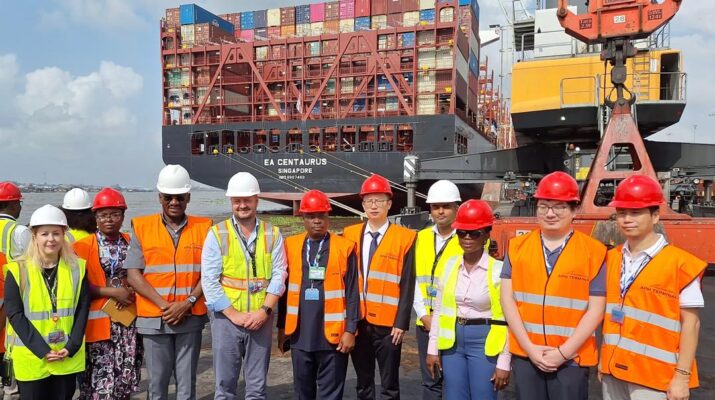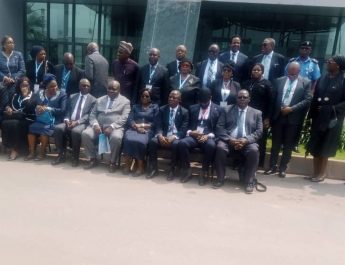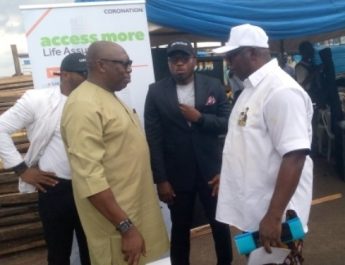Bonded terminal operators, freight forwarders and licensed Customs agents in Nigeria express frustration, and anger against foreign players who seek to dominate the shipping business sector and frustrate their businesses in spite of a cashable $100 million bank bond, while asking for a review of the NIPC Act to restrict foreign investors from unlimited access to freight forwarding and allied businesses
By Edu Abade
The Association of Bonded Terminals Operators has expressed concern and frustration over the way and manner in which foreign players have dominated the business in spite of Nigeria’s local content laws and a cashable $100 million bank bond, which they have not been able access due to foreign businesses’ interference.
Speaking at the PortNews Summit 2024 with the theme: “Port Reforms and Local Content, Has Nigeria Fared Well?” General Secretary of the association and Managing Director of Harsecom Logistics Limited, Aare Haruna Omolajomo, said that based on Federal Government policy on local content, the government can put in place a conscious policy of patronage of the Bonded Terminal Operations by the concessionaires.
He urged the Federal Government to urgently review its contractual obligations with the concessionaires and the indigenous bonded terminals on a 60:40 ratio, insisting that there should be separate operations for local content players that should be different from the foreign content in clearing agency, empty holding bay, inland ports, barge and shipping, among others.
Maintaining that the Nigeria Ports Authority (NPA) should be allocated some berths to operate in order to serve the needs of local content, he argued that this would enable the local content operators to be engaged and fare well and to be free from the Concessionaires’ oppression and frustration
“Just as in the pre-concession era when Indigenous bonded terminals and off-dock terminals were collecting certain fees and rents according to the tariffs agreed with the NPA for services rendered. The same should be regulated now. No bonded terminal should be made to collect fees on behalf of third parties.
“The NPA should be made to promote, facilitate and regulate the development of off-dock cargo handling facilities, bonded terminals and warehouses and facilitate their entry into cargo stemming contracts (40 percent of the physical containers) with the authority’s concessionaire for the transportation, storage, handling, delivery and (or) release of cargo for and to relevant cargo interest under Nigeria Customs Services clearance.
“The government should encourage or enforce the use of the ports as cargo transit area and not cargo storage area and ensure that the concessionaires comply with section 16(c) of the 1999 constitution. This is in relation with Nigeria’s local content policy of the Federal Government which the concessionaires had violated,” he stated.
Omolajomo also insisted that the containers sourced by the indigenous bonded terminal or inland ports should be allowed to go to these terminals without any hindrance from the concessionaires, adding that they should give a seven-day free demurrage within which to complete the processing and effect transfers.
“The indigenous bonded terminal operators should not be grouped together and treated as ordinary agents. Rather, they should be seen as major stakeholders in the industry as they are employers of labour,” he added.
In his welcome address, Publisher and Editor-In-Chief of PortNews Newspaper, Wale Oni noted that one profession in which Nigeria excelled and garnered international acclaim was the maritime and freight forwarding business, but lamented that that glorious era was gone and that the country does not know how to do it again.
He recalled that the port reforms undertaken under former President Olusegun Obasanjo between 2004 and 2006 ensured that port terminals and other infrastructure were handed over to private investors, mainly forein shipping companies, adding: “For instance, Nigeria’s largest container terminal at Bull Nose, Apapa Port Complex was ceded to Maersk Line affiliate company-APMT.
“Nigeria operators have lost the plot and they are now mere onlookers. What can we do to correct these anomalies? How do we introduce and sustain a mutually beneficial working relationship between Nigerian terminal operators and the concessionaires of our huge port terminals brimming with cargoes? He asked, adding that the summit was organized to find solutions to the puzzles.
Meanwhile, worried about the growing incursion of foreign companies into some maritime businesses, including freight forwarding, the federal government has been charged to review the Nigerian Investment Promotion Commission (NIPC) Act to restrict foreign investors from having unlimited access into business operations where there is enough indigenous capacity.
Chief Executive Officer, Centre for the Promotion of Private Enterprises, Dr. Muda Yusuf, who canvassed the position at the PortNews Summit in Lagos, noted that the NIPC Act, which gives foreign investors unlimited access to all sectors of the economy needs to be revisited urgently to protect domestic indigenous investors in sectors where the country has capacity especially in the maritime sector.
Pointing out that capacity grows with opportunity, he argued that there was the need to give indigenous players more opportunities to grow and reminded the government that the current trend is that “globally now, many countries are protecting their indigenous jobs.”
“A good example is the United States of America, reputed to be a model of free enterprise economy. The protectionism would get more intense under the Trump presidency,” he said.
He added that the President-elect of the USA, Donald Trump, has often made it clear that his administration will first protect American interest first.
Yusuf also pointed out that it is regrettable that the Cabotage Act, which was enacted in 2003 (21 years ago) to help develop the local shipping industry has not been effectively implemented.
“The law establishes that no foreign vessels ought to do business in Nigerian waters other than indigenous ships, while offering the local shipping lines the right of first refusal.
“The Nigerian Maritime Administration and Safety Agency (NIMASA) and the Nigeria National Petroleum Corporation (NNPC), need to step up on this matter in national interest. Not much has also happened with regards to the Cabotage fund disbursement to indigenous shipping companies. Ordinarily, this should be a low hanging fruit in promoting inclusion in the maritime sector.
Similarly, he advocated the need to expand the scope of presidential executive orders to “promote the patronage of made in Nigeria products and the hiring of local expertise and skills,” adding: “There could be similar executive orders to protect indigenous jobs in the maritime sector. Replicating the Local Content law of the oil and gas sector in the maritime sector.
“This law has had an incredible impact on indigenous capacity in the oil and gas sector. This model should be replicated in the maritime sector. If it can work in the oil and gas sector, it would work in the maritime sector.”
The Publisher of Port News, Wale Oni, whose company organized the event, in his welcome address, expressed concern over a situation in which foreign companies have simply made Nigerian operators spectators in their own business environment.
Oni said: “Why have the terminal operators and foreigners seemingly ganged up against Nigerian bonded terminal operators by denying them container transfers/perhaps , there is a technical or operational deficiency, some very difficult, rocket science puzzle that sets us behind and which our expatriate counterparts need to teach us.
“Nigerian operators have lost the plot, they are mere onlookers. What can we do to correct these anomalies? How do we introduce and sustain a mutually beneficial working relationship between terminal operators and the concessionaires of our huge port terminals with cargoes.”




